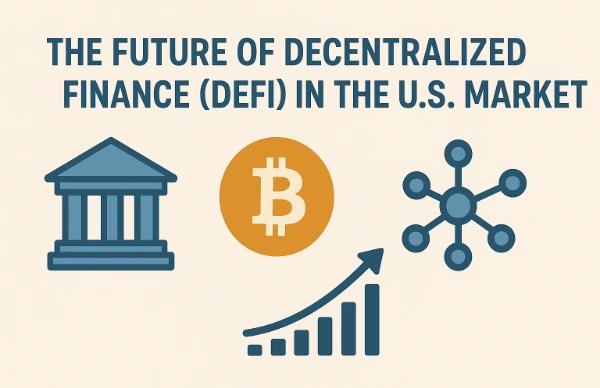The financial landscape is experiencing an unprecedented transformation as decentralized finance (DeFi) emerges as a game-changing force in the United States market. With traditional financial institutions grappling to adapt and regulators working to establish clear frameworks, the future of decentralized finance (DeFi) in the U.S. market promises to reshape how Americans access, manage, and interact with financial services.
As blockchain technology continues to mature and cryptocurrency adoption accelerates, DeFi protocols are attracting billions of dollars in investment while simultaneously challenging the very foundations of conventional banking. This comprehensive analysis explores the promising trajectory of the future of decentralized finance (DeFi) in the U.S. market, examining regulatory developments, technological innovations, market opportunities, and the transformative potential that lies ahead.
Table of Contents
Understanding DeFi: The Foundation of Financial Revolution
Decentralized finance represents a paradigm shift from traditional, centralized financial systems to open, permissionless protocols built on blockchain networks. Unlike conventional banking, where institutions act as intermediaries, DeFi eliminates middlemen through smart contracts that automatically execute financial transactions based on predetermined conditions.
The core principles driving the future of decentralized finance (DeFi) in the U.S. market include transparency, accessibility, and financial inclusion. These protocols operate 24/7 without geographical restrictions, enabling users to lend, borrow, trade, and earn yields on their digital assets without requiring approval from traditional gatekeepers.
Also read: Why American Investors Are Turning to Australian ASX Shares for Growth
Key Components Shaping DeFi’s American Future
The future of decentralized finance (DeFi) in the U.S. market is being shaped by several fundamental components that distinguish it from traditional finance:
Smart Contracts and Automation: Self-executing contracts with terms directly written into code eliminate the need for intermediaries, reducing costs and processing times while increasing transparency.
Liquidity Pools and Automated Market Makers (AMMs): These mechanisms enable continuous trading without traditional order books, providing liquidity for various financial activities and creating new income opportunities for participants.
Yield Farming and Staking: Users can earn passive income by providing liquidity or participating in network security, democratizing access to investment opportunities previously available only to accredited investors.
Composability and Interoperability: DeFi protocols can be combined like building blocks, creating complex financial products and services that leverage multiple platforms simultaneously.
Current State of DeFi in the United States
The United States currently leads global DeFi adoption, with American users representing a significant portion of total value locked (TVL) across various protocols. The future of decentralized finance (DeFi) in the U.S. market builds upon this strong foundation, which has already demonstrated remarkable growth despite regulatory uncertainties.
| Year | Total Value Locked (TVL) | Major Protocols | Regulatory Milestones |
|---|---|---|---|
| 2020 | $1 billion | Uniswap, Compound | Initial DeFi boom |
| 2021 | $100+ billion | MakerDAO, AAVE | Infrastructure Bill discussions |
| 2022 | $40-80 billion | Curve, Balancer | SEC enforcement actions |
| 2023 | $50-90 billion | Lido, PancakeSwap | Regulatory clarity initiatives |
| 2024 | $60-100 billion | Multiple protocols | State-level frameworks |
Market Penetration and User Demographics
American DeFi users typically fall into several key demographics that will significantly influence the future of decentralized finance (DeFi) in the U.S. market:
Tech-Savvy Millennials and Gen Z: These digital natives embrace DeFi’s technological advantages and represent the largest user base, driving innovation and adoption.
High-Net-Worth Individuals: Wealthy Americans are increasingly allocating portions of their portfolios to DeFi protocols, seeking higher yields and portfolio diversification.
Institutional Investors: Hedge funds, family offices, and corporate treasuries are beginning to explore DeFi opportunities, bringing significant capital and legitimacy to the space.
Financial Professionals: Traders, analysts, and financial advisors are incorporating DeFi strategies into their professional practices, accelerating mainstream adoption.
Regulatory Landscape and Its Impact on DeFi’s Future
The future of decentralized finance (DeFi) in the U.S. market heavily depends on regulatory clarity and compliance frameworks. American regulators, including the SEC, CFTC, and Treasury Department, are actively working to establish comprehensive guidelines that balance innovation with consumer protection.
Also read: Best Stock Market Apps in the US for Beginners and Experienced Traders in 2025
Federal Regulatory Developments
The Securities and Exchange Commission (SEC) has been particularly active in addressing DeFi-related issues, focusing on token classifications and securities law compliance. The future of decentralized finance (DeFi) in the U.S. market will be significantly influenced by how these regulatory bodies approach protocol governance tokens, yield-bearing investments, and decentralized autonomous organizations (DAOs).
Recent enforcement actions have provided valuable insights into regulatory thinking, with authorities emphasizing the importance of proper disclosure, anti-money laundering (AML) compliance, and know-your-customer (KYC) procedures. These requirements are pushing DeFi protocols toward hybrid models that maintain decentralization while meeting regulatory expectations.
State-Level Initiatives
Several American states are pioneering blockchain-friendly legislation that supports the future of decentralized finance (DeFi) in the U.S. market:
Wyoming: Leading the nation with comprehensive blockchain legislation and crypto-friendly banking laws.
Texas: Establishing itself as a crypto mining hub while developing DeFi-supportive regulatory frameworks.
Florida: Implementing progressive policies that encourage blockchain innovation and DeFi development.
New York: Despite strict BitLicense requirements, showing increased openness to regulated DeFi activities.
Compliance Technologies and Solutions
The future of decentralized finance (DeFi) in the U.S. market will likely feature sophisticated compliance solutions that enable regulatory adherence without sacrificing decentralization’s core benefits:
Zero-Knowledge Proof Systems: These technologies allow compliance verification without revealing sensitive user information, maintaining privacy while satisfying regulatory requirements.
Decentralized Identity Solutions: Self-sovereign identity protocols enable KYC compliance while giving users control over their personal data.
Automated Compliance Monitoring: AI-powered systems can monitor transactions for suspicious activity and automatically generate required regulatory reports.
Regulatory DAOs: Governance structures specifically designed to ensure ongoing compliance with evolving regulatory requirements.
Also read: Lululemon Athletica Inc Stock Price Prediction 2026, 2027, 2030, 2040, 2050
Technological Innovations Driving DeFi’s American Future
The future of decentralized finance (DeFi) in the U.S. market will be powered by cutting-edge technological innovations that address current limitations while expanding functionality and accessibility.
Layer 2 Solutions and Scalability
High transaction fees and network congestion on Ethereum have prompted the development of Layer 2 scaling solutions that are crucial for the future of decentralized finance (DeFi) in the U.S. market:
Optimistic Rollups: Solutions like Arbitrum and Optimism provide faster, cheaper transactions while maintaining Ethereum’s security guarantees.
ZK-Rollups: Zero-knowledge rollup technologies offer superior scalability and privacy features, enabling more complex DeFi applications.
Polygon and Sidechains: Alternative blockchain networks provide immediate scalability benefits while maintaining compatibility with existing DeFi protocols.
State Channels: Payment channels and state channels enable instant, near-zero-cost transactions for specific use cases.
Cross-Chain Interoperability
The future of decentralized finance (DeFi) in the U.S. market increasingly depends on seamless interoperability between different blockchain networks:
Bridge Protocols: Secure asset transfer mechanisms enable users to move funds between different blockchain ecosystems.
Multi-Chain Protocols: DeFi applications that operate across multiple blockchains simultaneously, providing users with more options and better liquidity.
Unified Interfaces: User-friendly platforms that abstract away blockchain complexity, making DeFi accessible to mainstream American users.
Artificial Intelligence and Machine Learning Integration
AI technologies are beginning to play important roles in shaping the future of decentralized finance (DeFi) in the U.S. market:
Automated Portfolio Management: AI-powered protocols that optimize yield farming strategies and risk management for users.
Predictive Analytics: Machine learning models that provide insights into market trends and optimal investment strategies.
Risk Assessment: Automated systems that evaluate protocol security and smart contract risks in real-time.
Personalized Financial Services: AI-driven platforms that tailor DeFi strategies to individual user preferences and risk profiles.
Market Opportunities and Growth Projections
The future of decentralized finance (DeFi) in the U.S. market presents enormous opportunities across multiple sectors, with analysts projecting substantial growth in the coming years.
Projected Market Growth
| Metric | 2024 Estimate | 2026 Projection | 2030 Projection |
|---|---|---|---|
| Total Addressable Market | $200 billion | $800 billion | $2.5 trillion |
| Active U.S. Users | 5 million | 25 million | 75 million |
| Institutional Adoption | 15% | 45% | 70% |
| Traditional Finance Integration | 10% | 35% | 60% |
Key Growth Sectors
Lending and Borrowing: Decentralized lending platforms offer competitive rates and 24/7 accessibility, attracting both individual and institutional borrowers seeking alternatives to traditional banking.
Asset Management: DeFi-based asset management solutions provide portfolio diversification and yield optimization opportunities previously available only to high-net-worth individuals.
Insurance: Decentralized insurance protocols protect users against smart contract risks, exchange hacks, and other DeFi-specific threats while providing coverage for traditional risks.
Derivatives and Structured Products: Sophisticated financial instruments built on DeFi infrastructure offer advanced trading strategies and risk management tools.
Institutional Adoption Drivers
The future of decentralized finance (DeFi) in the U.S. market will be significantly accelerated by institutional adoption driven by several factors:
Higher Yields: DeFi protocols often offer superior returns compared to traditional fixed-income investments, attracting institutional capital seeking yield in low-interest-rate environments.
24/7 Market Access: Unlike traditional financial markets, DeFi operates continuously, providing institutions with round-the-clock trading and investment opportunities.
Programmable Money: Smart contracts enable automated execution of complex financial strategies, reducing operational costs and improving efficiency.
Global Market Access: DeFi protocols provide instant access to global markets and assets without traditional intermediaries or geographic restrictions.
Also read: American Eagle Outfitters Inc Stock Price Predictions 2026, 2027, 2030, 2040, 2050
Challenges and Risk Mitigation Strategies
While the future of decentralized finance (DeFi) in the U.S. market appears promising, several challenges must be addressed to ensure sustainable growth and mainstream adoption.
Security Concerns and Solutions
Smart contract vulnerabilities and protocol exploits have resulted in billions of dollars in losses, highlighting the need for robust security measures:
Formal Verification: Mathematical proof systems that verify smart contract correctness before deployment.
Continuous Auditing: Ongoing security assessments and real-time monitoring of protocol operations.
Insurance Integration: Comprehensive coverage options that protect users against various types of losses and exploits.
Decentralized Security Services: Community-driven bug bounty programs and security research initiatives.
Scalability and User Experience
The future of decentralized finance (DeFi) in the U.S. market depends on solving current scalability limitations and improving user experience:
Gas Fee Optimization: Layer 2 solutions and alternative consensus mechanisms that reduce transaction costs.
Simplified Interfaces: User-friendly applications that hide blockchain complexity while maintaining functionality.
Mobile Accessibility: Native mobile applications that provide full DeFi functionality on smartphones and tablets.
Educational Resources: Comprehensive learning materials and tutorials that help users understand DeFi concepts and best practices.
Regulatory Compliance Integration
Balancing decentralization with regulatory compliance remains a significant challenge for the future of decentralized finance (DeFi) in the U.S. market:
Privacy-Preserving Compliance: Technologies that enable regulatory reporting without compromising user privacy.
Selective Decentralization: Hybrid models that maintain regulatory compliance while preserving DeFi’s core benefits.
Governance Token Compliance: Frameworks for ensuring governance tokens comply with securities regulations.
Cross-Border Coordination: International cooperation mechanisms that prevent regulatory arbitrage and ensure consistent compliance standards.
Also read: Figma Stock Price Prediction 2026, 2027, 2030, 2040, 2050
Impact on Traditional Financial Services
The future of decentralized finance (DeFi) in the U.S. market will fundamentally transform traditional financial services, forcing established institutions to adapt or risk obsolescence.
Banking Sector Transformation
Traditional banks are beginning to integrate DeFi technologies and services to remain competitive:
DeFi Integration: Major banks are exploring partnerships with DeFi protocols to offer cryptocurrency custody and trading services.
Blockchain Infrastructure: Financial institutions are implementing blockchain technology for improved transparency and efficiency.
Digital Asset Services: Banks are launching digital asset divisions to serve growing customer demand for cryptocurrency-related services.
Decentralized Payment Systems: Traditional payment processors are incorporating blockchain-based settlement systems for faster, cheaper transactions.
Investment Management Evolution
Asset management companies are adapting their strategies to incorporate the future of decentralized finance (DeFi) in the U.S. market:
DeFi Index Funds: Professionally managed funds that provide exposure to diversified DeFi protocol tokens.
Yield Farming Strategies: Institutional-grade yield optimization services that leverage multiple DeFi protocols.
Risk Management Tools: Sophisticated portfolio management systems designed specifically for DeFi investments.
Client Education Programs: Comprehensive educational initiatives that help traditional investors understand DeFi opportunities and risks.
Insurance Industry Adaptation
The insurance sector is evolving to address new risks and opportunities created by the future of decentralized finance (DeFi) in the U.S. market:
Smart Contract Insurance: Coverage specifically designed to protect against smart contract failures and exploits.
Crypto Asset Protection: Insurance products that cover digital asset theft, loss, and unauthorized access.
DeFi Protocol Coverage: Specialized policies that protect liquidity providers and protocol participants against various risks.
Parametric Insurance: Automated insurance products that use blockchain data to trigger payouts without traditional claims processes.
Also read: CRM Stock Price Prediction 2026, 2027, 2030, 2040, 2050
Consumer Adoption and Financial Inclusion
The future of decentralized finance (DeFi) in the U.S. market holds tremendous potential for improving financial inclusion and democratizing access to financial services across diverse American communities.
Addressing Traditional Banking Gaps
DeFi protocols can serve underbanked and unbanked populations that traditional financial institutions have historically overlooked:
No Credit History Requirements: DeFi lending protocols often rely on collateral rather than credit scores, providing access to individuals with limited credit history.
Lower Minimum Balances: Many DeFi services have no minimum balance requirements, making them accessible to users with limited funds.
Geographic Independence: Rural and remote communities can access sophisticated financial services without physical bank branches.
24/7 Availability: DeFi services operate continuously, accommodating users who cannot access traditional banking during standard business hours.
Educational Initiatives and Financial Literacy
The future of decentralized finance (DeFi) in the U.S. market will depend on comprehensive education programs that help Americans understand and safely use these new financial tools:
Community Workshops: Local educational programs that teach DeFi basics and best practices in accessible language.
Online Learning Platforms: Comprehensive digital courses that guide users from basic concepts to advanced DeFi strategies.
Multilingual Resources: Educational materials available in multiple languages to serve diverse American communities.
Mentorship Programs: Experienced DeFi users providing guidance and support to newcomers entering the ecosystem.
Also read: Microsoft Stock Price Prediction 2026, 2027, 2030, 2040, 2050
Demographic-Specific Opportunities
Different American demographic groups will experience unique benefits from the future of decentralized finance (DeFi) in the U.S. market:
Young Adults: Digital natives who embrace DeFi’s technological advantages and use it as their primary financial platform.
Gig Economy Workers: Independent contractors and freelancers who benefit from DeFi’s flexible, permissionless financial services.
Small Business Owners: Entrepreneurs who leverage DeFi for business financing, international payments, and treasury management.
Retirees: Senior citizens who use DeFi protocols to generate passive income from their savings and investments.
Innovation Hubs and Regional Development
The future of decentralized finance (DeFi) in the U.S. market is being shaped by regional innovation hubs that are fostering blockchain development and attracting DeFi companies.
Leading DeFi Innovation Centers
Silicon Valley, California: Traditional tech capital adapting to blockchain innovation with major venture capital funding and established tech infrastructure.
New York City, New York: Financial capital leveraging its deep expertise in traditional finance to drive DeFi innovation and institutional adoption.
Austin, Texas: Emerging as a major blockchain hub with supportive state policies and a growing ecosystem of DeFi startups.
Miami, Florida: Positioning itself as a crypto-friendly city with government support and major blockchain conferences and events.
Also read: Top U.S. Blockchain Companies to Watch in 2025
University Research and Development
Academic institutions are playing crucial roles in advancing the future of decentralized finance (DeFi) in the U.S. market:
Stanford University: Leading research in blockchain technology, smart contract security, and DeFi protocol optimization.
Massachusetts Institute of Technology (MIT): Pioneering work on cryptocurrency technologies and decentralized systems architecture.
Carnegie Mellon University: Advanced research in cryptography and security protocols essential for DeFi development.
University of California, Berkeley: Innovative work on consensus mechanisms and blockchain scalability solutions.
Corporate Innovation Labs
Major corporations are establishing dedicated teams to explore the future of decentralized finance (DeFi) in the U.S. market:
JPMorgan Chase: JPM Coin and blockchain initiatives that bridge traditional finance with DeFi technologies.
Goldman Sachs: Digital asset trading desks and DeFi research divisions exploring institutional opportunities.
Visa and Mastercard: Payment network innovations that integrate with blockchain and DeFi ecosystems.
Microsoft and IBM: Cloud infrastructure and enterprise blockchain solutions supporting DeFi development.
Global Competitiveness and Market Position
The future of decentralized finance (DeFi) in the U.S. market must be considered within the context of global competition and America’s strategic position in the worldwide blockchain ecosystem.
International DeFi Landscape
The United States faces competition from other nations developing their own DeFi ecosystems:
European Union: Comprehensive regulatory frameworks like MiCA (Markets in Crypto-Assets) providing clarity for DeFi development.
Singapore: Progressive regulatory approach attracting major DeFi companies and blockchain projects.
Switzerland: Crypto Valley in Zug serving as a major European hub for blockchain and DeFi innovation.
United Kingdom: Post-Brexit positioning as a global financial technology leader with DeFi-friendly policies.
American Competitive Advantages
Several factors position the United States favorably for the future of decentralized finance (DeFi) in the U.S. market:
Deep Capital Markets: Massive pools of institutional and retail capital available for DeFi investment and development.
Technological Innovation: Leading universities, research institutions, and tech companies driving DeFi advancement.
Regulatory Sophistication: Mature financial regulatory framework that can adapt to accommodate DeFi innovation.
Market Size: Large domestic market providing scale opportunities for DeFi protocols and services.
Strategic Policy Recommendations
To maintain leadership in the future of decentralized finance (DeFi) in the U.S. market, policymakers should consider:
Regulatory Clarity: Clear, consistent guidelines that provide certainty for DeFi developers and investors.
Innovation Sandboxes: Controlled environments where DeFi companies can test new products with relaxed regulatory requirements.
Public-Private Partnerships: Collaboration between government agencies and private sector to develop DeFi standards and best practices.
International Coordination: Working with allies to establish global DeFi standards and prevent regulatory fragmentation.
Future Trends and Predictions
The future of decentralized finance (DeFi) in the U.S. market will be shaped by several emerging trends and technological developments that are already beginning to materialize.
Next-Generation DeFi Protocols
Advanced DeFi protocols incorporating cutting-edge technologies will define the next phase of the future of decentralized finance (DeFi) in the U.S. market:
AI-Enhanced Protocols: Smart contracts that use machine learning to optimize yields, assess risks, and provide personalized financial services.
Quantum-Resistant Security: Cryptographic protocols designed to withstand potential quantum computer attacks, ensuring long-term security.
Real-World Asset Integration: DeFi protocols that tokenize traditional assets like real estate, commodities, and private equity.
Cross-Chain Governance: Unified governance systems that operate across multiple blockchain networks simultaneously.
Mainstream Integration Timeline
| Timeline | Milestone | Expected Impact |
|---|---|---|
| 2025-2026 | Major bank DeFi integration | 50% increase in institutional adoption |
| 2027-2028 | Regulatory framework completion | 300% growth in compliant protocols |
| 2029-2030 | Mainstream consumer adoption | DeFi becomes standard financial service |
| 2031-2035 | Traditional finance transformation | Complete industry restructuring |
Emerging Use Cases
The future of decentralized finance (DeFi) in the U.S. market will feature innovative applications that extend far beyond current use cases:
Decentralized Credit Scoring: AI-powered systems that assess creditworthiness using on-chain data and alternative metrics.
Programmable Corporate Finance: Smart contracts that automate complex business financial operations and treasury management.
Micro-Investment Platforms: DeFi protocols that enable fractional ownership of high-value assets with minimal entry barriers.
Social Impact Finance: Decentralized platforms that fund social and environmental initiatives through transparent, accountable mechanisms.
Economic Impact and Market Transformation
The future of decentralized finance (DeFi) in the U.S. market will generate significant economic impacts across multiple sectors and contribute to fundamental market transformations.
Job Creation and Economic Development
The growing DeFi ecosystem is creating new employment opportunities and driving economic development:
Technical Roles: Blockchain developers, smart contract auditors, and DeFi protocol architects commanding premium salaries.
Business Development: Sales, marketing, and partnership professionals specialized in blockchain and DeFi sectors.
Compliance and Legal: Regulatory experts, compliance officers, and legal professionals focused on DeFi law and policy.
Education and Training: Instructors, content creators, and educational program developers serving the growing demand for DeFi knowledge.
GDP Contribution Projections
Economic analysts estimate that the future of decentralized finance (DeFi) in the U.S. market could contribute significantly to American GDP:
Direct Contribution: DeFi protocols, exchanges, and related services generating substantial direct economic value.
Indirect Benefits: Improved financial efficiency and reduced intermediation costs benefiting the broader economy.
Innovation Spillovers: DeFi technologies driving innovation in traditional finance, technology, and other sectors.
Export Potential: American DeFi expertise and services creating new export opportunities in global markets.
Small Business and Entrepreneurship Impact
The future of decentralized finance (DeFi) in the U.S. market will particularly benefit small businesses and entrepreneurs:
Access to Capital: DeFi lending platforms providing business financing without traditional bank requirements.
International Payments: Blockchain-based payment systems reducing costs and complexity of international business transactions.
Treasury Management: DeFi protocols offering businesses better yields on cash reserves and working capital.
Decentralized Business Models: New organizational structures like DAOs enabling innovative business formation and governance.
Risk Management and Security Evolution
As the future of decentralized finance (DeFi) in the U.S. market unfolds, sophisticated risk management and security frameworks are evolving to address the unique challenges of decentralized systems.
Advanced Security Protocols
Next-generation security measures will be essential for the future of decentralized finance (DeFi) in the U.S. market:
Multi-Signature Wallets: Enhanced security through required multiple approvals for high-value transactions.
Hardware Security Modules: Specialized devices providing tamper-resistant storage for cryptographic keys and sensitive operations.
Decentralized Insurance Networks: Community-funded insurance pools providing coverage against various DeFi risks.
Real-Time Monitoring Systems: AI-powered platforms that detect suspicious activity and potential exploits in real-time.
Risk Assessment Frameworks
Sophisticated risk evaluation systems will be crucial for the future of decentralized finance (DeFi) in the U.S. market:
Protocol Risk Ratings: Standardized scoring systems that evaluate smart contract security and protocol reliability.
Liquidity Risk Models: Advanced analytics that assess market depth and liquidity risks across different DeFi protocols.
Regulatory Risk Assessment: Frameworks that evaluate compliance risks and regulatory exposure for different DeFi activities.
Correlation Analysis: Tools that identify interconnections and systemic risks across the DeFi ecosystem.
Conclusion: Embracing the DeFi Revolution
The future of decentralized finance (DeFi) in the U.S. market represents one of the most significant financial innovations of our time, with the potential to democratize access to financial services while improving efficiency and reducing costs across the entire financial system. As regulatory frameworks evolve, technology advances, and mainstream adoption accelerates, DeFi is poised to transform how Americans save, invest, borrow, and conduct financial transactions.
The journey toward widespread DeFi adoption will require continued collaboration between innovators, regulators, and traditional financial institutions. Success will depend on maintaining the core principles of decentralization while addressing legitimate concerns about security, compliance, and consumer protection.
American leadership in the future of decentralized finance (DeFi) in the U.S. market is not guaranteed and will require strategic investments in education, infrastructure, and regulatory clarity. The nations and regions that successfully balance innovation with appropriate oversight will capture the greatest benefits from this financial revolution.
As we look toward the future, DeFi’s promise extends beyond mere technological advancement to encompass broader ideals of financial freedom, inclusion, and empowerment. The future of decentralized finance (DeFi) in the U.S. market offers the opportunity to build a more equitable, efficient, and accessible financial system that serves all Americans while maintaining the United States’ position as a global financial leader.
The transformation is already underway, and the choices made today will determine whether the future of decentralized finance (DeFi) in the U.S. market fulfills its revolutionary potential or falls short of its promise. With thoughtful development, appropriate regulation, and continued innovation, DeFi can deliver on its vision of a truly decentralized financial future that benefits everyone.
Frequently Asked Questions
What is decentralized finance (DeFi) and how does it differ from traditional finance?
Decentralized finance (DeFi) refers to financial services built on blockchain technology that operate without central authorities or intermediaries. Unlike traditional finance, which relies on banks and financial institutions, DeFi uses smart contracts to automate financial transactions, providing 24/7 accessibility, lower costs, and greater transparency. The future of decentralized finance (DeFi) in the U.S. market promises to make financial services more accessible and efficient for all Americans.
Is DeFi legal in the United States?
Yes, DeFi is generally legal in the United States, though it operates in a complex regulatory environment. Different aspects of DeFi may fall under various regulatory jurisdictions, including the SEC, CFTC, and Treasury Department. The future of decentralized finance (DeFi) in the U.S. market will be significantly influenced by ongoing regulatory developments and compliance frameworks that are currently being established.
How can beginners safely get started with DeFi?
Beginners should start by educating themselves about blockchain basics, using reputable exchanges, starting with small amounts, and focusing on established protocols with good security track records. Essential safety practices include using hardware wallets, verifying smart contract addresses, and never sharing private keys. The future of decentralized finance (DeFi) in the U.S. market includes improved educational resources and user-friendly interfaces to make DeFi more accessible to newcomers.
What are the main risks associated with DeFi investments?
Key DeFi risks include smart contract vulnerabilities, impermanent loss in liquidity pools, regulatory changes, market volatility, and potential protocol exploits. Users should diversify their investments, understand the risks of each protocol, and only invest amounts they can afford to lose. The future of decentralized finance (DeFi) in the U.S. market includes developing better risk management tools and insurance products to protect users.
How does DeFi generate yields for investors?
DeFi generates yields through various mechanisms including lending interest, liquidity provision rewards, yield farming incentives, staking rewards, and trading fees. These yields often exceed traditional savings accounts because they eliminate intermediary costs and operate more efficiently. However, the future of decentralized finance (DeFi) in the U.S. market will likely see more sustainable yield models as the ecosystem matures.





